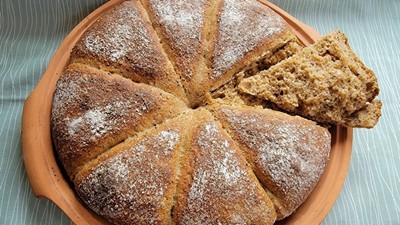
To see the previous installments, click on the following links: #1, #2 , #3, #4, #5, #6, #7, #8, #9, #10, #11, #12, #13, #14, #15, #16, #17, #18, #19, #20, #21, #22, #23, #24
It was a bright morning on the Via de la Abundance. The bustle of the street and the smell of freshly baked bread mingled with the warm light falling on the facades of the buildings. At last, I had achieved not only Aemilia's freedom, but also my own.
We had rented a modest second-floor flat on this very street and a shop on the ground floor of the building that we used as a bakery. From the small window of our flat, we looked with pride and satisfaction at the happy faces of those who came every day to buy our bread. Our shop had become a meeting point for many, attracted by the intoxicating aroma and the fame that our panis quadratus, the typical bread of Pompeii that we baked with care, had earned. Aemilia was the soul of this company, with her hands she moulded the bread and with her heart, she transmitted closeness.
Almost a year had passed since that fateful evening at Marcus Varius's house that changed the course of our lives. Now, together with Aemilia, in our small home and with the business we had built together, I was filled with gratitude. It was not, of course, the life she had dreamed of in her youth, nor the life that I, a traveller from other worlds, had envisaged. But, as always, Pompeii seemed to have its own rules for happiness, and they smiled on us here and now, in a present we could never have imagined but which had ended up making us truly happy.
However, this peace was not without its shadows. The trial of Marcus's son was imminent, and we knew that the outcome would be dictated not by fate or clemency, but by political alliances and self-interest. “The young man's fortune will not be favourable,” I confessed quietly to Aemilia one evening as we dined in our favourite corner. “Vespasian is weak, and his scales have fallen on the side of Lucius's family. You know well that the weight of influence in Rome is more powerful than the truth of the facts.”
Aemilia frowned, her eyes reflecting the unease my words were causing her. She knew that a decision against Marcus's son could not only seal his fate, but also trigger reprisals among those who, like us, had once been linked to the family. “Is there no way to save him, Hispanus?” she asked, resting his hand on mine. I, feeling the tenderness of her touch, looked at her gravely. There was no easy answer, and within me I recognised the weight of a truth that time had brought to my lips: “Though men make choices, fortune never stops turning its wheel. He has been condemned to death and on the 24th of June his head will be cut off. His sentence has been long delayed because of Vespasian's decrepitude but there is nothing that can be done.”
He knew, however, that what began as an accident and as a feud between families had turned into an ungovernable power struggle. While Vespasian was hardly holding on to his throne, the heirs, Titus and Domitian, were fighting for their own interests and the voices of those aggrieved by Lucius's assassination had become loud in Rome. And though Titus himself tried to remain neutral, his brother Domitian lost no opportunity to tilt justice in favour of his own supporters.
Aemilia, whose wisdom was as humble as it was profound, looked at me and said softly, “It is fortunate, Hispanus, that we have made our own peace here, in this house and in this bakery that we have built together.” And as she spoke those words, I felt an even greater peace than I found in the weight of Rome's history. For, in this small life, Aemilia and I had found a comfort that neither the laws of men nor the whim of the gods could take from us.
To be continued
Header Image:
Panis Quadratus: Ancient Bread of Pompeii. Author: Melissa Johnson
As you mentioned, I can feel it's getting to the climax. I really hope everybody will be happy at the end....
Thanks for sharing. The logical part of my mind what keeps the main character stuck in time about 2000 years ago. Only when when he dies in ancient Rome will be able to come back to the present? Perhaps by the end the story, the answer will be clear.
In Spain, we have a children's game that consists of hiding an object and children looking for it. If the children get close to the place where the object is, we say ‘hot’ and if they are far away, we say ‘cold’. Then... ‘hot, hot’... To be continued. Thank you very much, @yumiyumayume and Tim ( @T-Newfields ).
@druida The game sounds like "hide and seek" in Japan, but we don't say "hot" and "cold". It's very interesting. I'm saying "hot hot hot" in my mind!!
Thank you so much, @CocoPop and @VengefulTurtle.
So, the comma is used in English in the following situations:
Yep 👍🏼 that sounds about right.
Agreed!
To be honest, commas are one of those things that are the bane of most writers’ existence. Using them properly is normally taught very late here (if at all) and is something most people (myself included) have struggled to wrap their heads around! I appreciate being able to hash out the nuances, haha (: